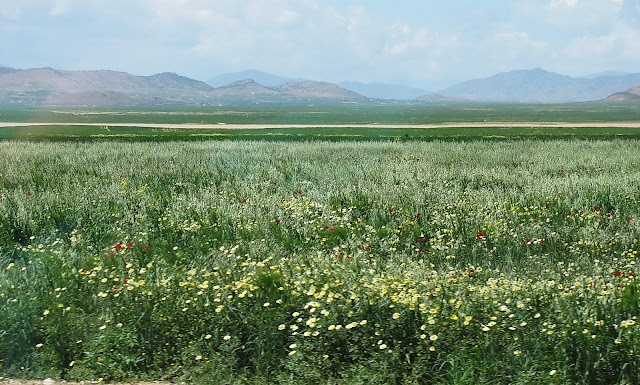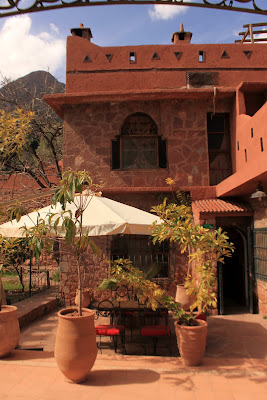I
consider myself to be reasonably well travelled. Having spent nearly
a third of my life abroad, both holidaying and living, I believe that
I should be experienced enough in the ways of other cultures to be
both flexible and accepting. During our recent explorations I have
come to the conclusion that in reality, I am sadly somewhat lacking
in both of these foundational traveller skills.
To be
fair this is not a wholly new discovery. In Thailand I would
regularly air my frustration at the fact that many people have a
deeply set inability to walk in straight line without dragging their
feet along the floor, or that it always took three people to do one
person's job, or the absolute impossibility of all parties in a group
having their food on the table at the same time. But as has happened
once before when I left Thailand swearing I would only return in
transit, in the face of other cultures habits, I have found myself
longing for the relatively forward thinking nation that I called home
for six years. This may be a case of simple 'absence makes the heart
grow fonder' or it may be that generally in Thailand you knew what
you were getting. If you go out for fast food, it's fast, if you
order breakfast, yes one will be late, but at least you get to start
on the first one, and if you pay for a relaxing weekend away in a
nice hotel, you get a relaxing weekend away in a nice hotel. And yes,
I am carefully omitting to mention all the stress you usually had to
encounter getting there, but that's the nature of writing...
Living in
Morocco we have found that nothing is ever simple; a car journey that
should take 4 hours will take six, even if you are on track for the
first 3.5 hours of it and you think that this will be for a change a
journey that goes to plan, you are doomed to encounter some hitch
that scuppers you and leaves you steaming with unhealthy frustration;
when out shopping or eating you remind yourself of all the tricks of
the trade and keep your wits sharp so as to not get conned, only to
get blind-sided by a totally new tactic for ripping you off; when
searching for a cosy weekend retreat you instead find yourself
shivering under the covers in a beautiful but unheated room cursing
the failing hot water system. To us, these are not luxurious things
that we long for. They are simply the things that we have come to
expect and take for granted with our western upbringings. Is is too
much to ask to make a journey on time, get what we paid for or have
hot water in a room. We have turned into critiques of the worst kind.
The simple pleasure of having a bedside light can fill us with joy
the minute we walk in a room. We are finding that we are spoiling one
of our favourite pastimes that we cultivated so well in Thailand...
the desire to explore.
An
example of this frustration occurred when we were travelling back
from the south of the Atlas Mountains. Preparing ourselves for a
undoubtedly longer journey than expected we left with plenty of time
and unlike the day before allowed ourselves time to search out
somewhere that would serve us food for lunch (not as easy a feat as
expected). While exploring Todra Gorge we spied a pretty place with a
view of a palm plantation. Due to yet another bad experience of being
really ripped off recently when we sat down to order we made sure we
asked to see the menu to avoid getting stung by ridiculous prices. To
our dismay we say that they were in fact well overpriced and we
decided we'd had enough of being ripped off and started to leave. At
this point our hosts brought us out tea that we had not ordered as it
was stinking hot sitting in the sun. This was very kind as it was
free, but it now meant that we were running late and still had to
find lunch.
Making
our excuses and leaving we then set off in search of lunch. We didn't
want anything fancy, just a Berber omelette and salad so we stopped
at a rather sad and very empty looking roadside café as we thought
it should be cheap and quick. After confirming and reconfirming price
and menu just to cover our bases, our host was thrilled to have us
and insisted on taking us in to the enormous old house they were
converting into a guest house. He was incredibly friendly and tried
to speak in English when we ordered. After this we waited. And
waited. And waited. Our host had disappeared until we caught glimpses
of him running after kids in the street. When I sought him out he
said something along the lines of 'quality fresh food takes time' and
that it was coming 'very soon'. When the omelette eventually arrived
we were so frustrated we had just about lost our appetites. The
omelette was enormous, big enough to feed about 8 people. This
immediately set all the alarm bells ringing that they had found just
another way to over charge us. We ate very little of it and went
downstairs to pay. We were irritated and tried not to be too abrupt,
saying that we had left most of it as it was enormous and we did not
have time to stay and eat it as it took so long. He just smiled and
asked “but was it good'? We confirmed that indeed it was, but that
was not the point. We were requested to pay what was agreed and then
left.
It was
only when driving away that I calmed and reflected with some clarity.
This poor man who was trying to improve his struggling business when
faced with the arrival of what must be quite scarce foreign visitors,
had probably only wanted to impress us. He wanted to give us as grand
a meal as he could where as we just wanted as quick a meal as we
could. He had gone out of his was to wow us and we were ungrateful.
This was a true case of western expectations getting in the way of
Moroccan hospitality. I will hold a sense of guilt over this incident
for quite some time to come.
With this
in mind I will set off today for two days in a farm. I will try my
hardest to be flexible, accepting and not simply a hotel critique.
























































